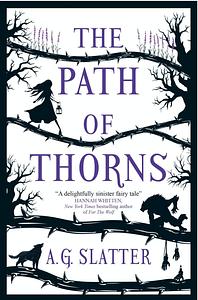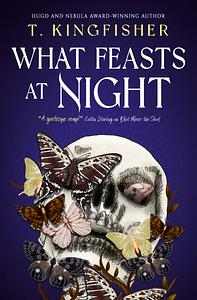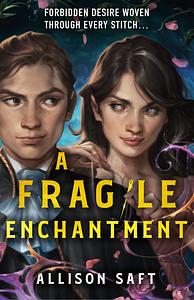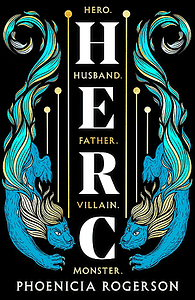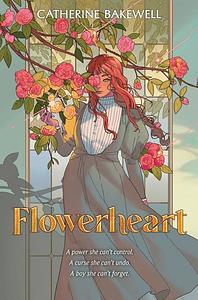Take a photo of a barcode or cover
ioannap_author's Reviews (17)
informative
fast-paced
This book was a nice little summary of Byzantine History. I am very familiar with Byzantium, so it was really easy for me to follow and acted as a nice refresher of major historical events. I am not sure how someone who has never studied in any way Byzantine history would find this and if they would be able to follow, but this was great for me as a refresher before delving into more academic books.
adventurous
dark
fast-paced
Plot or Character Driven:
Plot
Strong character development:
Yes
Loveable characters:
Complicated
Diverse cast of characters:
No
Flaws of characters a main focus:
Yes
"The Path of Thorns" by A.G.Slatter is a standalone instalment in the Sourdough Universe about a mysterious governess, Asher Todd, who arrives at Morwood Grange with a secret agenda.
I want to start by saying that the book includes MANY things, and it is an achievement in itself that this is done in such an elegant way. Despite the vast worldbuilding that the novel opens for a new reader (this is my second novel in that universe) it doesn't take away too much from the main plot and Slatter deserves an applause for achieving that balance alone.
The most compelling elements of the story were the mystery of the previous governess's dissappearance and the uncovering the sheer toxicity the Morwood family displayed. Slatter created another delicate balance between hating the Manor family so intently, pitying Asher, and also being horrified at the choices she makes for them.
Which is the core theme of the book. The desperate need for family, the ways one allows themselves to be mistreated so they can continue to belong, and the toll such toxic parenting takes on a person. In this book, Asher is literally haunted by all this, and all the small openings that are presented to her for something away from it she postpones taking because of her daughterly duty. Does she deserve a chance at a better life after all she has done by the end of the book? I am still not sure. I don't really know if the end Slatter gave us is a wink for a happier future for Asher or one she simply cannot put the blame on her mother for her own darker impulses. I like to believe that there was a chance for inner peace, and Asher took it.
Asher is not the only character whose future is potentially bleak. The sexism in the book created more than one woman whose corruption the reader has to reconcile with their desperate desire to just escape it all. I personally really liked the interactions between Asher and Luned and the brutal honesty between them, especially during their final conversation.
"A Path of Thorns" is perfect for readers who enjoy gothic fairytales, with atmospheric environments and morally grey characters.
I want to start by saying that the book includes MANY things, and it is an achievement in itself that this is done in such an elegant way. Despite the vast worldbuilding that the novel opens for a new reader (this is my second novel in that universe) it doesn't take away too much from the main plot and Slatter deserves an applause for achieving that balance alone.
The most compelling elements of the story were the mystery of the previous governess's dissappearance and the uncovering the sheer toxicity the Morwood family displayed. Slatter created another delicate balance between hating the Manor family so intently, pitying Asher, and also being horrified at the choices she makes for them.
Which is the core theme of the book. The desperate need for family, the ways one allows themselves to be mistreated so they can continue to belong, and the toll such toxic parenting takes on a person. In this book, Asher is literally haunted by all this, and all the small openings that are presented to her for something away from it she postpones taking because of her daughterly duty. Does she deserve a chance at a better life after all she has done by the end of the book? I am still not sure. I don't really know if the end Slatter gave us is a wink for a happier future for Asher or one she simply cannot put the blame on her mother for her own darker impulses. I like to believe that there was a chance for inner peace, and Asher took it.
Asher is not the only character whose future is potentially bleak. The sexism in the book created more than one woman whose corruption the reader has to reconcile with their desperate desire to just escape it all. I personally really liked the interactions between Asher and Luned and the brutal honesty between them, especially during their final conversation.
"A Path of Thorns" is perfect for readers who enjoy gothic fairytales, with atmospheric environments and morally grey characters.
adventurous
challenging
dark
emotional
informative
mysterious
sad
slow-paced
Plot or Character Driven:
Character
Strong character development:
Yes
Loveable characters:
No
Diverse cast of characters:
Yes
Flaws of characters a main focus:
Complicated
dark
mysterious
slow-paced
Plot or Character Driven:
Character
Strong character development:
No
Loveable characters:
No
Diverse cast of characters:
No
emotional
hopeful
fast-paced
Plot or Character Driven:
Plot
Strong character development:
Complicated
Loveable characters:
Complicated
Diverse cast of characters:
Yes
Flaws of characters a main focus:
No
"A Fragile Enchantment" by Alison Saft tells the story of Niamh, a seamstress with the power to weave emotions into the clothes she makes. When Niamh is invited to prepare the wardrobe of a royal wedding in the Kingdom of Avaland, she thinks this is the opportunity of a lifetime to change her family’s future.
The book delves into issues of arranged marriage, family expectations, homosexuality, freedom of expression, press freedom, worker's rights, and sacrificing one's health for their desires. So, it plays with a lot of themes, and for the most part, Saft keeps them in balance, which also naturally results in none taking centre stage and delving deeper.
When I began the novel, I was enthralled with the embroidery magic and the undertone of societal importance that possessing it offered. It was refreshing to watch the class struggle this created while Niamh explored high society as she was paraded around to act as a token of the Prince Regent's goodwill to the rebelling immigrants from Niamh's country. This tension created beautiful opportunities for Niamh's personal plans to clash with her desire for her Machlish compatriots' wellfare and for justice. While she is swept in the whirlwind of court schemes and country wide political intrigues, Niamh begins to grow closer to the groom of the royal wedding.
Prince Christopher - known as Kit - is no prince charming, despite his good looks. Their explosive relationship is slow to build into a romance, and if I am allowed one criticism, I found it unearned. I would have preferred this to be a friendship story that bridged the class divide. Saying that, I can’t deny how swoonworthy their romantic moments were after I pushed aside my objections to them actually becoming a couple. His character also touches on a lot of interesting subjects like addiction, alcoholism, and mental health and is linked with the exploration of the wider novel themes.
The world Saft built is a very thinly veiled reimagining of 19th-century Britain and Ireland's relationship. Even the names pinpoint to it as Niamh is a very Irish name. I usually find that very interesting, and I would have loved for the worldbuilding to develop further and to examine the complicated relationship between the colonising country and the rebelling colonised. I would have loved to see the inner turmoil of Niamh struggling to love the son of the King who brought so much death to her country and directly resulted in her own family’s pain. I would have loved for a revisionist fantasy that fixed some of the wrongs that real-life history never offered. But the absence of Machlish people in Niamh's life while she was at court didn't allow for that. All the politics happen away from Niamh, and even though she is asked to participate through her letters with the anonymous columnist, Lovelace, she doesn't take it. That would also be an interesting take and her attempt to hide from the choice she made, but it is also pushed aside too easily.
I don't want to sound overly harsh because I did enjoy reading the book overall. It might have frustrated me to see missed opportunities for a more complicated story pass by but the writing is beautiful, and I had fun with it. I do agree with some other reviewers that the book was a bit in the middle of adult and YA, and that didn't always work in its favour. Nevertheless, even though I didn't adore the couple as I did in "A Far Wilder Magic" (which deals with a lot of similar issues to) "A Fragile Enchantment" is a wonderful romantasy book that will take you in a beautiful fantastical Bridgerton style journey, filled with pretty dresses and dashingly handsome men.
The book delves into issues of arranged marriage, family expectations, homosexuality, freedom of expression, press freedom, worker's rights, and sacrificing one's health for their desires. So, it plays with a lot of themes, and for the most part, Saft keeps them in balance, which also naturally results in none taking centre stage and delving deeper.
When I began the novel, I was enthralled with the embroidery magic and the undertone of societal importance that possessing it offered. It was refreshing to watch the class struggle this created while Niamh explored high society as she was paraded around to act as a token of the Prince Regent's goodwill to the rebelling immigrants from Niamh's country. This tension created beautiful opportunities for Niamh's personal plans to clash with her desire for her Machlish compatriots' wellfare and for justice. While she is swept in the whirlwind of court schemes and country wide political intrigues, Niamh begins to grow closer to the groom of the royal wedding.
Prince Christopher - known as Kit - is no prince charming, despite his good looks. Their explosive relationship is slow to build into a romance, and if I am allowed one criticism, I found it unearned. I would have preferred this to be a friendship story that bridged the class divide. Saying that, I can’t deny how swoonworthy their romantic moments were after I pushed aside my objections to them actually becoming a couple. His character also touches on a lot of interesting subjects like addiction, alcoholism, and mental health and is linked with the exploration of the wider novel themes.
The world Saft built is a very thinly veiled reimagining of 19th-century Britain and Ireland's relationship. Even the names pinpoint to it as Niamh is a very Irish name. I usually find that very interesting, and I would have loved for the worldbuilding to develop further and to examine the complicated relationship between the colonising country and the rebelling colonised. I would have loved to see the inner turmoil of Niamh struggling to love the son of the King who brought so much death to her country and directly resulted in her own family’s pain. I would have loved for a revisionist fantasy that fixed some of the wrongs that real-life history never offered. But the absence of Machlish people in Niamh's life while she was at court didn't allow for that. All the politics happen away from Niamh, and even though she is asked to participate through her letters with the anonymous columnist, Lovelace, she doesn't take it. That would also be an interesting take and her attempt to hide from the choice she made, but it is also pushed aside too easily.
I don't want to sound overly harsh because I did enjoy reading the book overall. It might have frustrated me to see missed opportunities for a more complicated story pass by but the writing is beautiful, and I had fun with it. I do agree with some other reviewers that the book was a bit in the middle of adult and YA, and that didn't always work in its favour. Nevertheless, even though I didn't adore the couple as I did in "A Far Wilder Magic" (which deals with a lot of similar issues to) "A Fragile Enchantment" is a wonderful romantasy book that will take you in a beautiful fantastical Bridgerton style journey, filled with pretty dresses and dashingly handsome men.
adventurous
dark
emotional
medium-paced
Plot or Character Driven:
Character
Strong character development:
Complicated
Loveable characters:
No
Diverse cast of characters:
Yes
Flaws of characters a main focus:
Yes
"Herc" by Phoenicia Rogerson retells the story of Herakles (or Hercules if you prefer the roman version of the name) but with a twist. We never read Herakles's point of view. The novel is narrated by a large cast of all the people who met, loved, hated, died for, or were killed by Herakles.
I enjoyed this book. It was an easy and quick read, and I especially liked how we saw many versions of Herakles, which reflects the multifaceted array of his mythology. I appreciated the refreshing way the myths were depicted in a mockumentary style, always keeping an undertone of gossiping mentality.
The main theme of the book for me is mental health. I didn’t realise this from the beginning, but especially after Megara's chapter, it became clear to me that we watch a man who, I think, desperately wanted to atone, to be given permission to mourn but he was given irrelevant to his crime labours that offered him no relief and no lessons. Is it that surprising that he is slow to learn when no one wants to teach him how to express his emotions? Because, as the later chapters show, he CAN learn. (Not enough, perhaps, I'll agree to that. But Herakles grows.)
Simultaneously, I don't want to look at his murderous rages as simply mental health because that is a dangerous and unfair path to most people who live with mental health issues. Mental health is not a shield that excuses terrible/criminal behaviours, and those who suffer by it are most likely going to hurt themselves, not others. But outside of that, "Herc" is about witnessing the tale of a man who is consumed by his own story and prospects of glory. He hides his sadness behind his loud laughter, is clearly becoming an alcoholic and feels displaced. I did actually really appreciate the depiction of Herakles as a homeless person.
Each POV offered a very narrow view of Herakles (maybe his siblings' narration gave the more humane perspective), but altogether, they painted the portrait of a man whom I felt both sorry for and thought he was never placed under any kind of scrutiny. His punishments get increasingly more severe, but his divine lineage ensures favouritism and blaming Hera for everything that goes wrong allows him to avoid seeing his responsibility for his mistakes and, not once, do we see him express true remorse. And yet, I did feel sorry for him because myth by myth Herakles was shown to be the punching bag for Gods and maybe even humans. There were so many situations that I felt he was placed in simply to strip him of the joy of something he once depended on. The depiction of his night at Thespiae filled me with pity and sorrow for him.
By the time he met Deianeira, he was an older man, spent and with very few lessons. And yet, even at that final chance, which he was more careful with, Herakles can not escape his own vices, and these inevitably lead to his death. It was especially sad that his demise came by his attempts to be forgiven, not by the Gods, but by Iole, the human he had hurt when he killed Iphitos. It was, as if, the more he leaned into his human side, asking to be forgiven on human terms, the less the Gods cared and didn't protect him.
There were things I didn't like about the book as well. I think most originated from me being a native Greek speaker as the shortening of names always annoys me and the use of Hercules instead of Herakles to avoid saying Hera's name doesn't work in Greek. I also would have liked more geography to be given as Herakles explores all these places in Greece. However, I do note these are small issues that I was able to read past and engage in the retelling.
I would say this book combined my love of true crime documentaries and Greek mythology, which is an interesting combination. I loved the modern, gossip feel, and I think anyone who enjoys faithful to the original material retellings with a twist would also appreciate "Herc."
I enjoyed this book. It was an easy and quick read, and I especially liked how we saw many versions of Herakles, which reflects the multifaceted array of his mythology. I appreciated the refreshing way the myths were depicted in a mockumentary style, always keeping an undertone of gossiping mentality.
The main theme of the book for me is mental health. I didn’t realise this from the beginning, but especially after Megara's chapter, it became clear to me that we watch a man who, I think, desperately wanted to atone, to be given permission to mourn but he was given irrelevant to his crime labours that offered him no relief and no lessons. Is it that surprising that he is slow to learn when no one wants to teach him how to express his emotions? Because, as the later chapters show, he CAN learn. (Not enough, perhaps, I'll agree to that. But Herakles grows.)
Simultaneously, I don't want to look at his murderous rages as simply mental health because that is a dangerous and unfair path to most people who live with mental health issues. Mental health is not a shield that excuses terrible/criminal behaviours, and those who suffer by it are most likely going to hurt themselves, not others. But outside of that, "Herc" is about witnessing the tale of a man who is consumed by his own story and prospects of glory. He hides his sadness behind his loud laughter, is clearly becoming an alcoholic and feels displaced. I did actually really appreciate the depiction of Herakles as a homeless person.
Each POV offered a very narrow view of Herakles (maybe his siblings' narration gave the more humane perspective), but altogether, they painted the portrait of a man whom I felt both sorry for and thought he was never placed under any kind of scrutiny. His punishments get increasingly more severe, but his divine lineage ensures favouritism and blaming Hera for everything that goes wrong allows him to avoid seeing his responsibility for his mistakes and, not once, do we see him express true remorse. And yet, I did feel sorry for him because myth by myth Herakles was shown to be the punching bag for Gods and maybe even humans. There were so many situations that I felt he was placed in simply to strip him of the joy of something he once depended on. The depiction of his night at Thespiae filled me with pity and sorrow for him.
By the time he met Deianeira, he was an older man, spent and with very few lessons. And yet, even at that final chance, which he was more careful with, Herakles can not escape his own vices, and these inevitably lead to his death. It was especially sad that his demise came by his attempts to be forgiven, not by the Gods, but by Iole, the human he had hurt when he killed Iphitos. It was, as if, the more he leaned into his human side, asking to be forgiven on human terms, the less the Gods cared and didn't protect him.
There were things I didn't like about the book as well. I think most originated from me being a native Greek speaker as the shortening of names always annoys me and the use of Hercules instead of Herakles to avoid saying Hera's name doesn't work in Greek. I also would have liked more geography to be given as Herakles explores all these places in Greece. However, I do note these are small issues that I was able to read past and engage in the retelling.
I would say this book combined my love of true crime documentaries and Greek mythology, which is an interesting combination. I loved the modern, gossip feel, and I think anyone who enjoys faithful to the original material retellings with a twist would also appreciate "Herc."
emotional
hopeful
lighthearted
relaxing
fast-paced
Plot or Character Driven:
Character
Strong character development:
Complicated
Loveable characters:
Yes
Diverse cast of characters:
Yes
Flaws of characters a main focus:
Yes
"Flowerheart" by Catherine Bakewell is a young adult cottagecore fantasy novel that tells the story of Clara, a young girl who longs to be a witch, but her magic is far too unpredictable.
I think from many books I have read that call themselves young adult, this is truly a book that is not aimed at adults. In my opinion, "Flowerheart" has a lot of dark elements, but it doesn't delve into them. The characters do not stare at the nuanced cruelties that are teased, and as an adult reading this book, I am partly frustrated by this omission, but I think it is proper for a teenager. Especially one on the younger side.
I liked the way the flower magic worked. It made the book feel very visual, and I really enjoyed the way the language of flowers became a plot point. It was beautiful to see them as clues for hidden emotions but also very creepy when they nearly choked the life out of Clara's father. In a way, the flowers set Clara apart from other wizards/witches in the book, not only because they weren't bursting with frenzied magic but also because they could hide their intentions in ways that Clara's flowers never allowed.
Truth vs. Lies is a recurring theme in the book. You see it in all of Clara's relationships with her important people. Her father, who is overall a very sweet and darling man, hides his feelings and memories of Clara's mother. He does it to protect his daughter, and we are shown a case of white lies.
Xavier, Clara's old friend and romantic interest, hides his own feelings as he doesn't feel brave or ready to admit his own feelings and mistakes. This is another case of lies that I personally can not be very angry about as people, even horrible ones, and espeically 16 year old boys, are allowed their privacy. Is it a lie to refuse to answer a question? Does anyone have the right to demand an answer?
Clara's teacher, Madame Ben Ammar, hides information because her position as a member of the Council of Magicians makes it improper to divulge them to Clara, who is not even a witch.
Imogen, Clara's mother, has hidden herself, and her entire persona, labelled as criminal, is also partly a lie when Clara finally reconnects with her. She forces a silence spell onto Clara to ensure her safety and that of her fellow coven menbers because she doesn't trust Clara's ability to lie.
Finally, there is a muddled line between Clara and her magic and their eventual conversation reveals the discord of truth and deception that Clara and her magic (a part of herself I want to call it) share. Her magic is a liar, stating Clara's worst fears as truths, but because it is linked with Clara's emotions, it blooms the flowers that reveal the truest and most authentic emotions.
This very nicely leads me to the second main theme of this book. Mental health. In the book, it appears to me that all wizards/witches are healers. Health related spells appear to be the sole purpose of magic. Despite that, mental health is taboo, mirroring our own medical history. It is something no witch or wizard is willing to attempt to fix, which in turn leads to people feeling lost, alone, and turning to dangerous, illegal, and harmful substances (again mirroring how often people who suffer with addiction were lead there by their desire to self-medicate).
It also creates people, like Xavier Morwyn, who have magical knowledge and attempt to find a solution for their family members who suffer from illnesses like melancholy (depression in our world). And then there is the added injustice that those who try to help are considered criminals, even though there is no official alternative offered at all. The terrible side effects that these incomplete attempts create are especially detested because they showcase very emphatically how big the mental health issue is and how wrong it is that the council is not trying to help with it.
All these nuances exist between the line in "Flowerheart," but they are at a surface level. They demand some critical thinking and comparison with the real world to unpluck them. However, I think if a 14 year old read this book, it would allow them to engage with the themes without being overwhelmed.
"Flowerheart" is a sweet, quick read read for young adults who are looking for an Anne of Green Gables tale but with magic.
I think from many books I have read that call themselves young adult, this is truly a book that is not aimed at adults. In my opinion, "Flowerheart" has a lot of dark elements, but it doesn't delve into them. The characters do not stare at the nuanced cruelties that are teased, and as an adult reading this book, I am partly frustrated by this omission, but I think it is proper for a teenager. Especially one on the younger side.
I liked the way the flower magic worked. It made the book feel very visual, and I really enjoyed the way the language of flowers became a plot point. It was beautiful to see them as clues for hidden emotions but also very creepy when they nearly choked the life out of Clara's father. In a way, the flowers set Clara apart from other wizards/witches in the book, not only because they weren't bursting with frenzied magic but also because they could hide their intentions in ways that Clara's flowers never allowed.
Truth vs. Lies is a recurring theme in the book. You see it in all of Clara's relationships with her important people. Her father, who is overall a very sweet and darling man, hides his feelings and memories of Clara's mother. He does it to protect his daughter, and we are shown a case of white lies.
Xavier, Clara's old friend and romantic interest, hides his own feelings as he doesn't feel brave or ready to admit his own feelings and mistakes. This is another case of lies that I personally can not be very angry about as people, even horrible ones, and espeically 16 year old boys, are allowed their privacy. Is it a lie to refuse to answer a question? Does anyone have the right to demand an answer?
Clara's teacher, Madame Ben Ammar, hides information because her position as a member of the Council of Magicians makes it improper to divulge them to Clara, who is not even a witch.
Imogen, Clara's mother, has hidden herself, and her entire persona, labelled as criminal, is also partly a lie when Clara finally reconnects with her. She forces a silence spell onto Clara to ensure her safety and that of her fellow coven menbers because she doesn't trust Clara's ability to lie.
Finally, there is a muddled line between Clara and her magic and their eventual conversation reveals the discord of truth and deception that Clara and her magic (a part of herself I want to call it) share. Her magic is a liar, stating Clara's worst fears as truths, but because it is linked with Clara's emotions, it blooms the flowers that reveal the truest and most authentic emotions.
This very nicely leads me to the second main theme of this book. Mental health. In the book, it appears to me that all wizards/witches are healers. Health related spells appear to be the sole purpose of magic. Despite that, mental health is taboo, mirroring our own medical history. It is something no witch or wizard is willing to attempt to fix, which in turn leads to people feeling lost, alone, and turning to dangerous, illegal, and harmful substances (again mirroring how often people who suffer with addiction were lead there by their desire to self-medicate).
It also creates people, like Xavier Morwyn, who have magical knowledge and attempt to find a solution for their family members who suffer from illnesses like melancholy (depression in our world). And then there is the added injustice that those who try to help are considered criminals, even though there is no official alternative offered at all. The terrible side effects that these incomplete attempts create are especially detested because they showcase very emphatically how big the mental health issue is and how wrong it is that the council is not trying to help with it.
All these nuances exist between the line in "Flowerheart," but they are at a surface level. They demand some critical thinking and comparison with the real world to unpluck them. However, I think if a 14 year old read this book, it would allow them to engage with the themes without being overwhelmed.
"Flowerheart" is a sweet, quick read read for young adults who are looking for an Anne of Green Gables tale but with magic.

